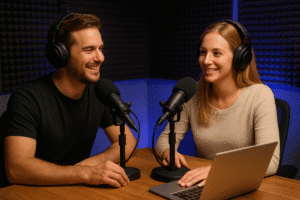Welcome to English: Podcast and Quiz
Get ready to start your English learning journey! In this lesson, you will learn the basics to help you communicate in simple and common situations.

This lesson introduces English beginners to essential language skills, including introducing yourself, using the verb 'be', and asking questions. Learn key vocabulary for numbers, countries, and nationalities, practice forming questions and more
Speaker 1
When you think about learning a new language, the first step can feel pretty intimidating. But honestly, the basics of English are all about simple, real-life situations—like meeting new people or filling out a form at the library.
Speaker 2
Totally! I remember my first English lesson—half of it was just learning how to say ‘Hello, my name is…’ and trust me, that opened so many doors. Once you get those basics down, it becomes much easier to jump into conversations, even if you feel a little nervous at first.
Speaker 1
It’s a bit like building a house—you need a solid foundation. And that foundation usually starts with introducing yourself and knowing a few key words. Just knowing how to say where you’re from or how old you are can make you feel way more confident.
Speaker 2
Actually, that reminds me—every English learner I’ve met lights up the first time they can answer a question like, ‘Where are you from?’ or ‘How old are you?’ There’s something empowering about being able to talk about yourself, even in simple sentences.
Mastering Introductions and the Verb ‘Be’
Speaker 1
So, let’s talk about those first meet-and-greet moments. The verb ‘to be’ pops up everywhere—like ‘I am Sophia’ or ‘We are new friends.’ But it trips up a lot of beginners, doesn’t it?
Speaker 2
Yes, especially because English switches things up depending on who you’re talking about! For example, we say ‘I am,’ but ‘she is’ and not ‘she am.’ It’s just a tiny difference, but it changes the whole sentence.
Speaker 1
And when you add in questions, it gets even trickier. Suddenly, you’re flipping the words around: ‘You are from Mexico’ turns into ‘Are you from Mexico?’ It feels a bit like playing with building blocks until it clicks.
Speaker 2
I’ve had students laugh at how much they repeat themselves when practicing: ‘Yes, I am.’ ‘No, I’m not.’ It sounds funny at first, but repeating both the subject and the verb really helps cement it in your brain. Plus, it’s how native speakers sound natural!
Talking About Yourself: Numbers, Countries, and Professions
Speaker 1
Now, once you’ve got introductions down, it’s time to add some details—like your age, where you’re from, or what you do. Numbers and countries come in handy super quickly, especially in small talk.
Speaker 2
Honestly, there’s always that moment when someone asks, ‘How old are you?’ or ‘Where do you live?’ and being able to answer, ‘I’m 25 years old. I’m from Brazil,’ feels like a real win! And those tricky number words, like ‘seventy-three’ or ‘ninety-eight,’ get easier with practice.
Speaker 1
Filling out a form in English can seem daunting at first, but it’s really just a list: your name, age, country, phone number, all that. Once you know the words, it’s almost like filling out any form back home.
Speaker 2
For sure! And I love that English lets you use contractions, so you can sound casual—like ‘We’re students’ instead of ‘We are students.’ That little change makes you sound a lot more natural, even if you’re just starting out.
Common Mistakes and Confidence Boosters
Speaker 1
Funny enough, most beginners make the same mistakes—mixing up ‘is’ and ‘are,’ or forgetting to flip the question order. But honestly, getting those wrong at first is just part of the process.
Speaker 2
That’s so true. And you know, nobody expects perfection right away. I always tell my students, each mistake is a stepping stone. Plus, when you finally get a tricky sentence right, it feels like unlocking a little achievement badge!
Speaker 1
Exactly! The best part is when you can answer basic questions without thinking twice. It might just be, ‘Yes, it is,’ when someone asks if pizza is good—but those tiny successes build confidence quickly.
Speaker 2
And the more you practice, the more automatic it becomes. Before you know it, you’re not just learning English—you’re actually using it to connect with people. That’s the real magic of starting with the basics. If you enjoyed this free lesson, don’t stop here! Take our free English placement test and get a free trial week of our dynamic online classes. Discover your level, meet great teachers, and start improving your English today! Click the button below to start your free trial week of dynamic online English classes!
✨ ¿Aún no eres estudiante de Inglés con Joe? ¡Esta es tu oportunidad! ✨
En solo unos minutos puedes:
🎓 Descubrir tu nivel real de inglés con nuestro examen de ubicación GRATIS
📄 Recibir un certificado que demuestra tu nivel
🎁 Reclamar una semana de clases en línea GRATIS adaptadas a ti
✅ ¡Completa el examen y toca el botón de WhatsApp que aparece con tus resultados para obtener tu semana gratis!
Welcome to English! © 2025 by Joe Ehman is licensed under Creative Commons Attribution-NonCommercial-ShareAlike 4.0 International
